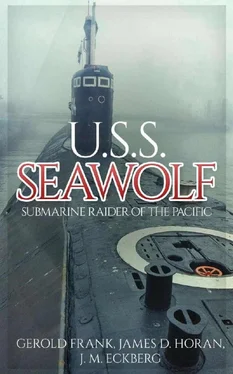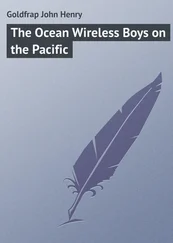When I finally got away from there and stood in front of the Wolf , I did my best to keep the Squalus out of my mind. Yard workmen were laying the Wolf ’s teakwood decking, riveters were assembling her periscope shears, painters were daubing a thick black coat of paint on her sides, which swelled outward so gracefully at the waterline. Her heavy bronze bell was being rigged. Under the scaffolding I could make out her clean, trim lines. She was pretty.
Watching, thinking about it all, I couldn’t know then what lay before us—Cavite and the stench of Jap dead in the harbor of Manila; the looting of the Philippines; terror and split-second escapes from death in the shallow waters of the Lombok Straits; day and night raids on Jap shipping from Christmas Island to Corregidor; depth charges and depth charges and depth charges—many missions and 40,000 miles under the Pacific, and weeks on end without seeing the sun—well, nobody could have dreamed of anything like that, then. It was August 1939, and the newspapers that day were full of the threat of war.
I’d come to Portsmouth that morning from San Diego, where I’d been advanced in rank to radioman, first class, and transferred from the U.S.S. Plunger . Months earlier, in Pearl Harbor, I’d put in for the Seawolf when I learned she was being built, and they had told me that if I was selected, I’d sail under Lieutenant Commander Frederick Warder, of Grafton, West Virginia. He’d been in charge of outfitting the Wolf from the beginning. I learned now that he was laid up with a bad knee. Less than an hour after I’d seen the Wolf , I knocked at his door on the second floor of the hospital in the Navy Yard.
A soft voice with just the trace of a drawl said, “Come in,” and I walked in. He was in bed. I introduced myself. He looked up at me with the steadiest blue eyes I’ve ever seen. “Eckberg, eh?” he said. “Radioman?”
“Yes, sir,” I said. “I got in today. They told me you had a bad knee. I’ve just been transferred from the Plunger .”
“Good!” said Captain Warder heartily. “I’m glad to see you.”
I was to learn that “Good!” was his favorite expression. Had we sunk a Jap man-of-war? Good! Were we winning or losing? Good! If the first, we’ll do better still; if the second, we’ll come back twice as hard.
He struggled to sit up. I helped him. He was a small, trim man, almost schoolteacher-ish in appearance, but with authority in every gesture. He appeared to be four or five years older than I was—say about thirty-five. Firm lips, determined chin, piercing blue eyes under narrowed lids, smooth face. I’d learned about him. Graduate of Annapolis, 1925; graduate, M.S. in engineering, University of California, 1934; submarine engineer; married, father of four children—a competent citizen of the United States Navy.
“This knee of mine,” he began, and with an effort he swung about and sat on the edge of the bed. “It’s been bothering me ever since I slipped on the ice last winter.” He looked me up and down and suddenly began firing questions. “Have you seen the Wolf yet?”
“Just a little while ago, Captain,” I said.
“How do you like her?”
I told him. I liked her lines. She looked clean.
“She’s a damn fine boat!” he said, and that was that.
As for me, why had I been transferred? Had I asked for a new boat? Why? What sort of radio gear did I have on the Plunger? Was I familiar with this type and that? His questions were direct. As head radio and sound man on the Wolf , I’d be her eyes and ears under water. A submarine is blind below periscope depth, and her only contact with the world is by sound. She feels and gropes her way along the bottom of the sea, between shoals, over reefs—all by sound. She recognizes the enemy’s approach by sound and measures the success of her attacks by sound.
I answered his questions.
“Good!” he said finally, and gave me my first order. “Go down to the Seawolf and look around. Dig for information. You’ll have plenty of time. Learn that boat. Go there after the yard workmen knock off, and they won’t bother you. But learn that boat.”
“Aye, aye, Captain,” I said. “I sure will.”
“Very well, Eckberg,” he said. He smiled. “I’ll be seeing you.”
In the Navy “Aye, aye” means “I have heard your order and will attend to it,” and “Very well” means “I have heard what you have said and acknowledge it.” We’d hit it off right, Captain Warder and I, at the very beginning.
That night, as we had supper in the dinette of the small furnished house we’d taken in Portsmouth, I told my wife, Marjorie, about it. Marjorie is blonde and slender and good-natured and blessed with common sense. She grew up in Chicago, met me when I was still a third-class radioman, and, in spite of the gloomy warnings of her friends and my own irresponsibility, married me. She liked music and she liked the sea. She was proud to be a Navy wife. In the five years of our marriage she had never complained of the haphazard life we’d led. But I knew the Squalus tragedy had hit her hard. She listened silently as I talked about the Wolf , and told her how impressed I was with the calm sureness and friendliness of my new skipper. She poured the coffee. “Is he married?” she asked.
I grinned. I knew Marjorie. Like all navy wives, she felt better if she knew her husband’s skipper was married and had a family waiting at home for him. They like to think that tends to make a captain keep both feet on the ground and not take needless risks.
“Yes,” I said. “Married and with four children, too.”
Marjorie looked out the window. Through that window, on a clear day, you could see Portsmouth Harbor. You could see the Isle of Shoals; you could see the submarines as they went out to sea and took their first dives. It was off the Isle of Shoals that the Squalus dived.
“Well,” she said, “I suppose that will give me more peace of mind. I don’t think I’ll ever forget the men on the Squalus . I want a husband that’s alive, Mel.”
The crew of the Wolf began to gather now—picked submarine men from all over the world, from San Diego and Mare Island, China and New London, Panama and Seattle—burly men, ham-fisted and barrel-chested; little wiry men who looked as though they’d jump at a noise but turned out to be made of cold-drawn steel; soft-looking men who could bake a cake or strangle a man; psalm-singers and book-lovers; swaggering lady-killers and men with ice-water in their veins; Jew and Gentile, Italian, Swede, Dane, German, Scotch, Irish, Pole—Americans who were to take over the Wolf with me and make her the great searaider she was, one of the greatest of all time. These are submarine men. They know how to keep their hands busy and their mouths shut. They’re tough-muscled and tough-minded. They size each other up quickly. A hearty clasp of the hand, a swift appraisal, a grin. “I was on the S-41 .”—“Hell, no! Jesus, you must know my old buddy, Duke Briggs.”—“Know him? Why…” Hand clasps, old stories revived, new friendships made.
Most of us meet in the Submarine Barracks, Building 150, assigned to the Seawolf’ s crew. Here, eight hours a day, we study blueprints of the Wolf . A submarine such as the Wolf needs a crew of 65—three complete crews each on an eight-hour shift, and specialists all. Officers, electricians, machinists, radiomen, firemen, signalmen, torpedomen, fire-controlmen, cooks, mess boys. The Wolf has to be our home, a battleship on the surface, a raider under the surface, able to hold her own against anything on the sea, below it or above it.
Читать дальше






![Hubert Bancroft - The Native Races [of the Pacific states], Volume 5, Primitive History](/books/749157/hubert-bancroft-the-native-races-of-the-pacific-s-thumb.webp)

![Hubert Bancroft - The Native Races [of the Pacific states], Volume 1, Wild Tribes](/books/750126/hubert-bancroft-the-native-races-of-the-pacific-s-thumb.webp)



![Edward Ellis - Adrift on the Pacific - A Boys [sic] Story of the Sea and its Perils](/books/753342/edward-ellis-adrift-on-the-pacific-a-boys-sic-s-thumb.webp)